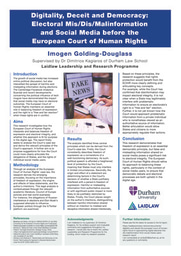“Digitality and Deceit: The European Court of Human Rights’ Future in Approaching Digital Electoral Mis/Dis/Malinformation from Social Media Users” - Research Report
Absolutely delighted to announce that today marks my submission point for my Laidlaw Summer One Research Project, entitled: “Digitality and Deceit: The European Court of Human Rights’ Future in Approaching Digital Electoral Mis/Dis/Malinformation from Social Media Users”.
My report is the first to comment on the published judgment in Bradshaw and Others v UK. The landmark case offered the Court its first opportunity to balance the right to freedom of expression and the right to free and fair elections in the context of social media. In a significant judgment, the Court found that disinformation is capable of interfering with a citizen's right to free and fair elections, under Article 3 Protocol 1 of the European Convention on Human Rights.
While the judgment illustrates a State’s positive obligations to protect a right to free and fair elections, there is no clear consensus on what these obligations should be. Centrally, my research makes suggestions for the Court’s future with electoral digital mis/dis/malinformation. Overall, I conclude that the Court would benefit from reflecting on its current treatment of political speech on social media, especially preceding an election, as well as considering the level of protection afforded to the Article 10 rights of private individuals who may be treated as authoritative sources of information.
This project would not have been possible without the endless support of my supervisor, Dr Dimitrios Kagiaros. I am truly indebted to him for his guidance, comments and insights. I have always looked forward to our meetings and receiving notes on the (many) drafts which preceded this one.
Following the Bradshaw judgment, this topic is one that will undoubtedly become a central focus of the literature. If anyone is, or knows someone who is, looking for a research assistant or co-author, please get in touch. I am keen to keep researching and writing in this area.



Please sign in
If you are a registered user on Laidlaw Scholars Network, please sign in